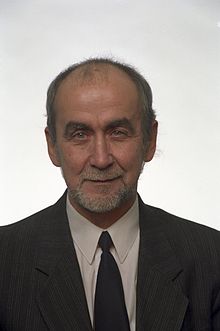Imants Kalniņš
This article needs additional citations for verification. (January 2017) |
Imants Kalniņš | |
|---|---|
 | |
| Background information | |
| Born | 26 May 1941 |
| Origin | Riga, Latvian SSR (now Latvia) |
| Genres | Classical music, Choral music, Rock music |
| Occupation(s) | composer, songwriter |
| Years active | 1964–present |
Imants Kalniņš (born 26 May 1941 in Riga, Latvian SSR) is a Latvian composer, musician and politician. Having studied classical and choral music, he has written six symphonies, several operas (including the first rock opera in the USSR, Ei, jūs tur! (English: Hey, you there!)), oratorios, cantatas, choir songs, a lot of movie and theater music. However, he is generally best known for his rock songs and is to be considered the first composer of intellectual rock music in Latvia.
Furthermore, he served as a member of the 5th, 7th, 8th, and 9th sitting of the Saeima, the parliament of Latvia, from 1993 to 1995 and again from 1998 through 2010, representing the For Fatherland and Freedom/LNNK party.
In 2021, Kalniņš received the Great Music Award.[1]
Life and career[]
During the 1960s, Kalniņš led the Liepāja rock band 2xBBM, which was extremely loved because of its heartfelt songs and hippy-like lifestyle. Kalniņš became the symbol of the spirituality, rebellion and worldview of the generation, and it was emphasized by the fact the band was forced to stop playing because of the pressure from official institutions. However, this doesn't stop the music of Kalniņš from being heard - it is played by the incredibly popular band (Latvian for 'minuet'), which plays songs almost exclusively by Kalniņš.
During the 1970s, Kalniņš returned to writing symphonic music.[2] In 1984, he wrote the rock oratorio Kā jūra, kā zeme, kā debess (Like the sea, like the earth, like the sky) together with and . The oratorio was the first thing played by the band Pērkons ('Thunder') for the general public. With it Kalniņš returned to rock and roll once more. He wrote many new songs for Pērkons, and these same songs led him to start his own band, Turaidas Roze ('The Rose Of Turaida'). However, the band never gained the recognition and adoration that Menuets and Pērkons did.
During the third awakening of the Latvian people, when Latvia regained independence, Kalniņš took part actively in Tautas Fronte (Popular Front) political organization, which played the most important part in ending Latvia's occupation by the USSR.
The festival most associated with Kalniņš is the ('The Days of Imants'), extremely popular during the Soviet times and therefore banned. The tradition was reintroduced in 1995, and since then has happened every year (with the exception of 1997, when the composer was away on a trip, and 2009 – in the time of economic downturn). It has remained at least as popular as before.
Lately Imants Kalniņš has been working together with the well-known Latvian musician , and their collaboration has resulted in some of the most excellent albums containing primarily music by Kalniņš, such as Par lietām, kas tā ar' nekad nepāriet (About things that never truly go away) (1997), Es redzēju sapnī (I Saw in a dream) (1998) and I Love You (1999; despite the title, the lyrics are mostly in Latvian in this album).
In 2000, music for the 1973 movie Pūt, vējiņi (Blow, wind, blow) was re-recorded by the Liepāja Symphony Orchestra as well as many recognized singers.
Kalniņš also composed the song "Pilsētā, kurā piedzimst vējš" ("In the city where the wind is born"), the anthem of Liepāja.
Imants Kalniņš has been one of the most loved composers in Latvian music for the past half-century, and his phenomenon is showing no sign of fading.
In April 2015, Kalniņš was reported to have converted Islam by some outlets,[3] but Kalniņš himself has later refuted these claims.[4]
Private life[]
Kalniņš was married to the actor Helga Dancberga who died in 2019. They had three children, Dana Kalniņa-Zaķe who became the lead for the Latvian Association of Professional Health Care Chaplains, actress Rezija Kalniņa and Krists Kalniņš who is a pastor.[5]
References[]
- ^ "Simfoniskās mūzikas «kopotie raksti» un balva par mūža ieguldījumu. Stāsta Imants Kalniņš" (in Latvian). Latvijas Radio. 14 February 2021. Retrieved 8 August 2021.
- ^ "The ten most important musical works of Latvia's centenary". Public Broadcasting of Latvia. 1 August 2018. Retrieved 31 August 2018.
- ^ "Imants Kalniņš pieņēmis islamticību".
- ^ "Jebkura vara – tā ir ideoloģija. Saruna ar komponistu Imantu Kalniņu".
- ^ "Mūžībā aizgājusi aktrise Helga Dancberga". www.lsm.lv (in Latvian). Retrieved 2020-01-08.
- 1941 births
- Living people
- 20th-century classical composers
- 20th-century male musicians
- 20th-century translators
- 21st-century classical composers
- 21st-century male musicians
- Latvian composers
- Soviet composers
- Soviet male composers
- Male classical composers
- Latvian translators
- Quran translators
- Musicians from Riga
- Latvian National Independence Movement politicians
- Latvian Farmers' Union politicians
- For Fatherland and Freedom/LNNK politicians
- Deputies of the Supreme Council of the Republic of Latvia
- Deputies of the 5th Saeima
- Deputies of the 7th Saeima
- Deputies of the 8th Saeima
- Deputies of the 9th Saeima
- Politicians from Riga